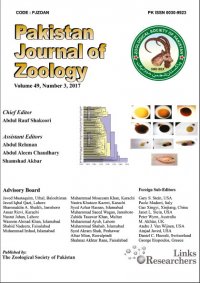Effect of Dietary Pongamia pinnata on Immunity and Gut Microflora in Broiler Chickens
Effect of Dietary Pongamia pinnata on Immunity and Gut Microflora in Broiler Chickens
Ahmed Ali Chandio1, Asghar Ali Kamboh1*, Nazar Ali Korejo2, Riaz Ahmed Leghari3 and Muhammad Ali Chandio4
ABSTRACT
Pongamia pinnata is an indigenous medicinal plant of Asia, which has long traditional use, having anti-inflammatory, anti-pyretic, anti-nociceptive, anti-oxidant, anti-ulcer, antihyperglycaemic and anti-microbial activities. The current investigation aimed to explore the immunomodulatory and gut microflora modulatory effects of dietary P. pinnata in broilers. Day old broiler chicks (n=125) were purchased from local hatchery and equally divided into the five groups, i.e., C (control) that offered basal diet, while, T1, T2, T3 and T4 groups were supplemented 0.5, 1, 1.5 and 2% P. pinnata leaf powder (PPLP) in basal diet respectively. The experimental groups were observed for the performance parameters, antibody titer against Newcastle disease virus (NDV), relative weight of lymphoid organs (bursa, spleen and thymus) and enumeration of gut microflora. Results showed that PPLP improved (P < 0.05) production performance, final body weight, carcass weight and relative weight of lymphoid organs. Anti-NDV titer was improved on both 21 (P > 0.05) and 35 (P < 0.05) day in PPLP supplemented groups as compared to control. Total bacterial count and Lactobacillus count was increased (P < 0.05), while coliform count was decreased (P < 0.05) on day 21 in PPLP supplemented groups comparing with the control group. In summary PPLP had positive impact on performance, parameters of humoral and cellular immunity and gut microflora in a dose-dependent fashion thus suggested its’ inclusion in broilers diet up to 2% level.
To share on other social networks, click on any share button. What are these?









